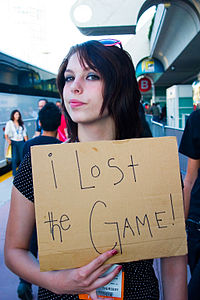The Game (mind game)

A player announces her loss of The Game at San Diego Comic-Con International in July 2008.
|
|
| Playing time | Indefinite (Ongoing) |
|---|---|
| Random chance | Partially |
| Skill(s) required | Thought suppression, strategy |
| Material(s) required | None |
The Game is a mental game where the objective is to avoid thinking about The Game itself. Thinking about The Game constitutes a loss, which must be announced each time it occurs. It is impossible to win most versions of The Game. Depending on the variation of The Game, the whole world, or all those aware of the game, are playing it all the time. Tactics have been developed to increase the number of people aware of The Game and thereby increase the number of losses.
Though the origins of The Game are unknown, a game featuring ironic processing was played by Leo Tolstoy in 1840.
There are three commonly reported rules to The Game:
What constitutes thinking about The Game is not always clear. If one discusses The Game without explicitly realizing that they have lost, this may or may not constitute a loss. If someone says "What is The Game?" before understanding the rules, whether they have lost is up for interpretation. According to some interpretations, one does not lose when someone else announces their loss, although the second rule implies that one loses regardless of what made them think about The Game. After a player has announced a loss, or after one thinks of The Game, some variants allow for a grace period between three seconds to thirty minutes to forget about the game, during which the player cannot lose the game again.
The common rules do not define a point at which The Game ends. However, some players state that The Game ends when the Prime Minister of the United Kingdom announces on television that "The Game is up."
Most variations of The Game do not allow for a person to win. One interpretation is that one is winning the game whenever they are not thinking about it. An xkcd comic reads: "You just won The Game" and tells players, "You're free!" Another is that one has won when they have completely forgotten about The Game. Another common interpretation is to have a temporary state of winning when in the presence of someone losing the game, the state of winningness ends when the 30min grace period expires.
Strategies focus on making others lose The Game. Common methods include saying "The Game" out loud or writing about The Game on a hidden note, in graffiti in public places, or on banknotes. Associations may be made with The Game, especially over time, so that one thing inadvertently causes one to lose. Some players enjoy thinking of elaborate pranks that will cause others to lose the game.
...
Wikipedia
